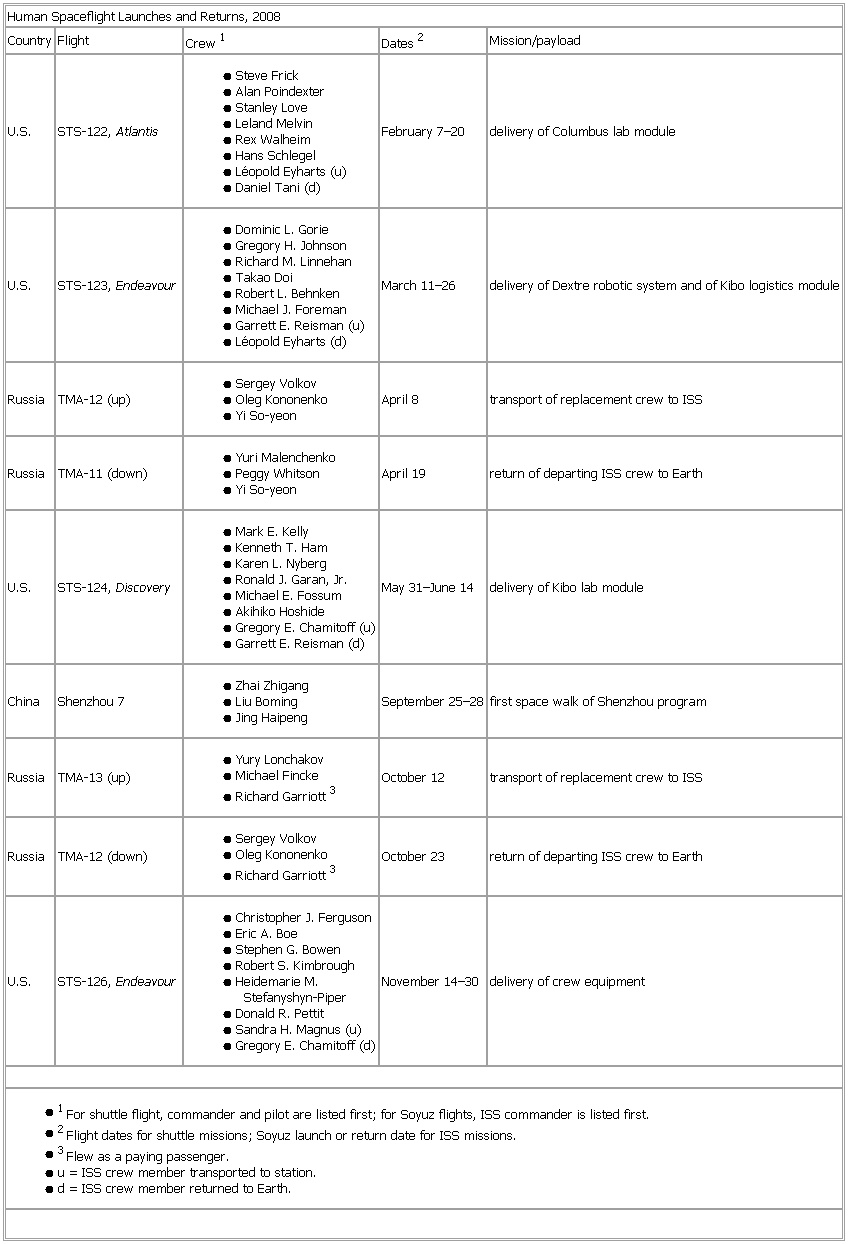Human Spaceflight Launches and Returns, 2008
- Human Spaceflight Launches and Returns, 2008
-
Human Spaceflight Launches and Returns, 2008
Country Flight Crew1 Dates2 Mission/payload
● Steve Frick
● Alan Poindexter
● Stanley Love
● Leland Melvin
● Rex Walheim
● Hans Schlegel
● Léopold Eyharts (u)
● Daniel Tani (d)
February 7–20 delivery of Columbus lab module
● Dominic L. Gorie
● Gregory H. Johnson
● Richard M. Linnehan
● Takao Doi
● Robert L. Behnken
● Michael J. Foreman
● Garrett E. Reisman (u)
● Léopold Eyharts (d)
March 11–26 delivery of Dextre robotic system and of Kibo logistics module
● Sergey Volkov
● Oleg Kononenko
● Yi So-yeon
April 8 transport of replacement crew to ISS
● Yuri Malenchenko
● Peggy Whitson
● Yi So-yeon
April 19 return of departing ISS crew to Earth
● Mark E. Kelly
● Kenneth T. Ham
● Karen L. Nyberg
● Ronald J. Garan, Jr.
● Michael E. Fossum
● Akihiko Hoshide
● Gregory E. Chamitoff (u)
● Garrett E. Reisman (d)
May 31–June 14 delivery of Kibo lab module
China Shenzhou 7
● Zhai Zhigang
● Liu Boming
● Jing Haipeng
September 25–28 first space walk of Shenzhou program
● Yury Lonchakov
● Michael Fincke
● Richard Garriott3
October 12 transport of replacement crew to ISS
● Sergey Volkov
● Oleg Kononenko
● Richard Garriott3
October 23 return of departing ISS crew to Earth
● Christopher J. Ferguson
● Eric A. Boe
● Stephen G. Bowen
● Robert S. Kimbrough
● Heidemarie M.
Stefanyshyn-Piper
● Donald R. Pettit
● Sandra H. Magnus (u)
● Gregory E. Chamitoff (d)
November 14–30 delivery of crew equipment
● 1For shuttle flight, commander and pilot are listed first; for Soyuz flights, ISS commander is listed first.
● 2Flight dates for shuttle missions; Soyuz launch or return date for ISS missions.
● 3Flew as a paying passenger.
● u = ISS crew member transported to station.
● d = ISS crew member returned to Earth.
See as table:
* * *
Universalium.
2010.
Look at other dictionaries:
Spaceflight — For the magazine published by the British Interplanetary Society, see Spaceflight (magazine). For the 1985 PBS documentary series narrated by Martin Sheen, see Spaceflight (TV series). For the Sam Lazar album, see Space Flight (album). Part of a… … Wikipedia
Physical Sciences — ▪ 2009 Introduction Scientists discovered a new family of superconducting materials and obtained unique images of individual hydrogen atoms and of a multiple exoplanet system. Europe completed the Large Hadron Collider, and China and India took… … Universalium
Space Race — For a discussion of all spaceflight programs to date, see History of spaceflight. For a list of key events, see Timeline of space exploration. For other uses of the term, see Space Race (disambiguation). A replica of Sputnik 1, the world s… … Wikipedia
space exploration — Investigation of the universe beyond Earth s atmosphere by means of manned and unmanned spacecraft. Study of the use of rockets for spaceflight began early in the 20th century. Germany s research on rocket propulsion in the 1930s led to… … Universalium
Spacecraft — Spaceship redirects here. For other uses, see Spaceship (disambiguation). More than 100 Russian Soyuz manned spacecraft (TMA version shown) have flown since 1967, originally for a Soviet manned lunar program, but currently supporting the… … Wikipedia
Mir — This article is about the Soviet/Russian space station. For other uses, see Mir (disambiguation). Mir … Wikipedia
Constellation program — logo Constellation Program (abbreviated CxP) is a human spaceflight program within NASA, the space agency of the United States. The stated goals of the program were to gain significant experience in operating away from Earth s environment,… … Wikipedia
21st century — Millennium: 3rd millennium Centuries: 20th century · 21st century · 22nd century Decades: 2000s 2010s 2020s 2030s 2040s 2050s … Wikipedia
Moon landing conspiracy theories — Astronauts Buzz Aldrin and Neil Armstrong in NASA s training mockup … Wikipedia
Shenzhou spacecraft — Shenzhou (zh cp |c=神舟 |p=Shén Zhōu) is a spacecraft developed by the People s Republic of China to support its manned spaceflight program. Its design is based on the Russian Soyuz spacecraft, and is much bigger. Like most Chinese military… … Wikipedia

